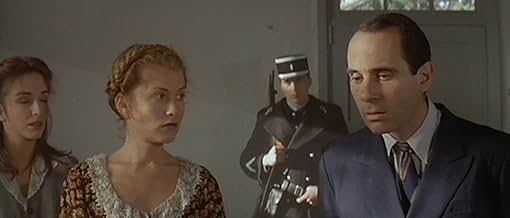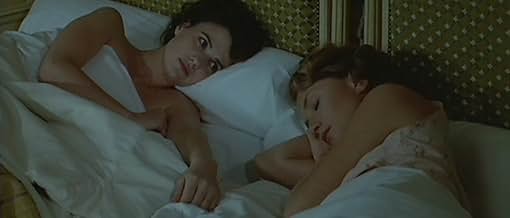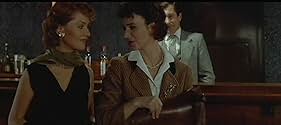Ein jüdischer Flüchtling heiratet einen Soldaten, um der Deportation nach Deutschland zu entgehen. Währenddessen verliert eine wohlhabende Kunststudentin ihren ersten Ehemann durch eine veri... Alles lesenEin jüdischer Flüchtling heiratet einen Soldaten, um der Deportation nach Deutschland zu entgehen. Währenddessen verliert eine wohlhabende Kunststudentin ihren ersten Ehemann durch eine verirrte WiderstandskugelEin jüdischer Flüchtling heiratet einen Soldaten, um der Deportation nach Deutschland zu entgehen. Währenddessen verliert eine wohlhabende Kunststudentin ihren ersten Ehemann durch eine verirrte Widerstandskugel
- Für 1 Oscar nominiert
- 2 Gewinne & 7 Nominierungen insgesamt
Empfohlene Bewertungen
It's a very nice feminist movie that doesn't make the men monsters -- they're just as bewildered with a world turned upside down as anyone else. Nonetheless, it's a pleasure to watch these two fine actresses give their performances as they come to understandwhat friendship means.
Michel (Guy Marchand) falls in love with Jewish refuge Lena (Isabelle Huppert) at first sight and offers marriage as a way she can avoid being sent to a German concentration camp. She accepts, and although she doesn't love him, they have two children and are still married when we pick up the action again in Lyons in 1952 when Lena is 29-years-old. There she meets the sophisticated and well-to-do artist Madeleine (Miou-Miou) who awakens her to the drabness of her existence as a housewife with a loutish husband who now runs a gas station. The attraction between Lena and Madeleine is very strong, and very threatening to the men, especially to Michel.
Huppert's poignant and bittersweet portrayal reminds me of her delicate work in Madame Bovary (1991). There is the same listlessness expressed along with a vague desire for something better out of life, and the anticipation of the sadness that we know will come of such desire. Miou-Miou is sharp and cynical with perhaps a streak of the manic-depressive about her. The love they spontaneously feel for one another is real and beautiful and makes us want it to be fulfilled. But Lena holds herself back because of her family, and then it is the men and propriety that get in the way.
Of course this is very French and Lena and Madeleine hold hands and comfort one another while telling each other their innermost secrets including the infidelities of their spouses, etc. (The men have no such communication.) Director Diane Kurys exercises more restraint in showing the physical nature of their mutual attraction than would be displayed today. Lena says to Madeleine at one point, "I want to kiss you," but we do not see them kissing. The most explicit scene sexually is the startling, but delicately expressed, meeting with the soldiers on the train where we discover the full extent of Lena's frustration.
This is not quite a great movie. The pace is a little slow in spots and sometimes the focus is not as sharp as it could be. But it is an extraordinarily honest movie, and I'll take that over sharp technique any day. Huppert is not only at her best here, but her exquisite and subtle beauty is shown to great advantage. Miou-Miou is also very pretty of course--this is the first time I've seen her--so I would say her strength of character is perhaps her strongest suit. This is a human tragedy on a small, intimate scale, one that we can't help but feel could have been averted had those involved understood one another better, had they been a little wiser. We've all been there before and so we can share the sadness and the sense of loss.
The incompatibility is brought home to the woman by her class, education, style, grace and education. (The sophisticated one, played by Miou Miou is just extraordinary acting). In essence, the sophisticated woman causes the central woman (played by Isabelle Huppert) to realize that her husband is a dolt, and that they share far more than she and her husband. The wonderful thing about the movie is that though the husband is a boob, insensitive and sometimes prone to violent anger, there is no doubt that he slaves for his family, is very humble, and deeply loves his wife and his two daughters - no question about it.
We get to see his pain as his wife falls out of love for him, his sometimes violent jealousy of the woman who has made his wife see him differently, and his heartbreak. It's quite profound. Those who say it all ends happily were watching another movie!
I loved the periods, the costumes, the settings - from Paris on Liberation Day through the 1940s and 1950s. Although it's the daughter's story, we see much of how the couple earlier met, married and began their married life. You will love it - it's more fast-paced than many French movies, and wrenching.
Wusstest du schon
- WissenswertesThe movie is based on Diane Kurys' parents and the woman that came between them.
- PatzerAt the celebration following Liberation, the U.S. flag has 50 stars. At that time there would have been a 48-star flag.
- Zitate
Lena Weber: [showing off a black cocktail dress] Do you like it? You don't? Madeleine lent it to me.
Michel Korski: She didn't dare wear it? Take it off at once.
Lena Weber: What's got into you?
Michel Korski: Know what you look like? It's so tight, I can see your panty line.
Lena Weber: [takes off her panties] There. No more panty line. Gone!
- VerbindungenFeatured in At the Movies: Special Show: At the Cassette Store, Part 3 (1986)
- SoundtracksSi tu Vois ma Mère
Music by Sidney Bechet
Performed by Sidney Bechet
Editions du Carrousel - disques Vogue
Top-Auswahl
- How long is Entre Nous?Powered by Alexa
Details
- Erscheinungsdatum
- Herkunftsland
- Offizieller Standort
- Sprachen
- Auch bekannt als
- Entre Nous
- Drehorte
- Produktionsfirmen
- Weitere beteiligte Unternehmen bei IMDbPro anzeigen
Box Office
- Bruttoertrag in den USA und Kanada
- 3.974.975 $
- Weltweiter Bruttoertrag
- 3.974.975 $
- Laufzeit1 Stunde 50 Minuten
- Sound-Mix
- Seitenverhältnis
- 2.35 : 1
Zu dieser Seite beitragen





























